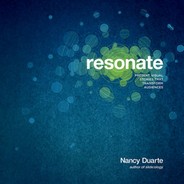
66 Resonate
Now that you’ve spent time getting into the audience’s
hearts and heads, it’s time to look at your role as
mentor. But wait—weren’t you told earlier not to think
about yourself? So which is it? It does seem like a
contradiction, but mentors are selfless and think of
themselves in the context of others. These exercises
will help you think about yourself in terms of what you
can give the audience.
Your role as mentor is to influence the hero (audience)
at critical junctures of his life. The mentor’s appearance
in the journey is essential to moving the hero past the
blockades of doubt and fear. Mentors usually have two
major responsibilities: teaching and gift-giving.
In the movie The Karate Kid (1984), Mr. Miyagi not only
teaches protégé Daniel the “tool” of karate; he gives
him insights into the meaning of life:
Miyagi: What matter?
Daniel: I’m just scared. The tournament and everything.
Miyagi: You remember lesson about balance?
Daniel: Yeah.
Miyagi: Lesson not just karate only. Lesson for whole
life. Whole life have a balance. Everything be
better. Understand?
Meet the Mentor
What insights into life can you give the audience? Draw
on your own deep truths and transfer to your audience
a sense for what it would be like for them to walk fully in
their calling.
Stay mindful of how you fit into their lives. You are mak-
ing a small appearance in your hero’s grand life story to
help get him unstuck and provide him with the resources
to help him on his journey. Yes, you have important infor-
mation to convey—maybe even a deal to close—but your
presentation should offer something valuable too.
The mentor should provide the hero with important,
useful, previously unknown information. You should also
motivate the hero when she is fearful or hesitant and
give the hero tools for her tool belt. These tools could be
roadmaps for success, new communication techniques,
or even insights into her soul. No matter what the tool is,
the audience should leave each presentation knowing
something they didn’t know before and with the ability
to apply that knowledge to help them succeed.
You mustn’t come across as if the audience is helping
you on your journey. You’re to be a gift to them. Every
once in a while, mentors gain something from the rela-
tionship for themselves, like knowledge or insights—but
that shouldn’t be your goal. An audience can always
spot selfish motives.
Miyagi was a pretty smart dude. He got
his deck sanded, car washed, plus his
fence and house painted out of the deal.
At times, there’s benefit to the mentor,
but the greater benefit should always
be for the hero.
CH003.indd 66CH003.indd 66 8/16/10 4:02:40 PM8/16/10 4:02:40 PM

Get to Know the Hero 67
What You
Give Them
GUIDANCE
What insights and
knowledge will help them
navigate their journey?
CONFIDENCE
How can you bolster
their confidence so
they aren’t reluctant?
TOOLS
What tools, skills, or magical
gifts do they gain from you
on their journey?
CH003.indd 67CH003.indd 67 8/16/10 4:02:40 PM8/16/10 4:02:40 PM
..................Content has been hidden....................
You can't read the all page of ebook, please click here login for view all page.
